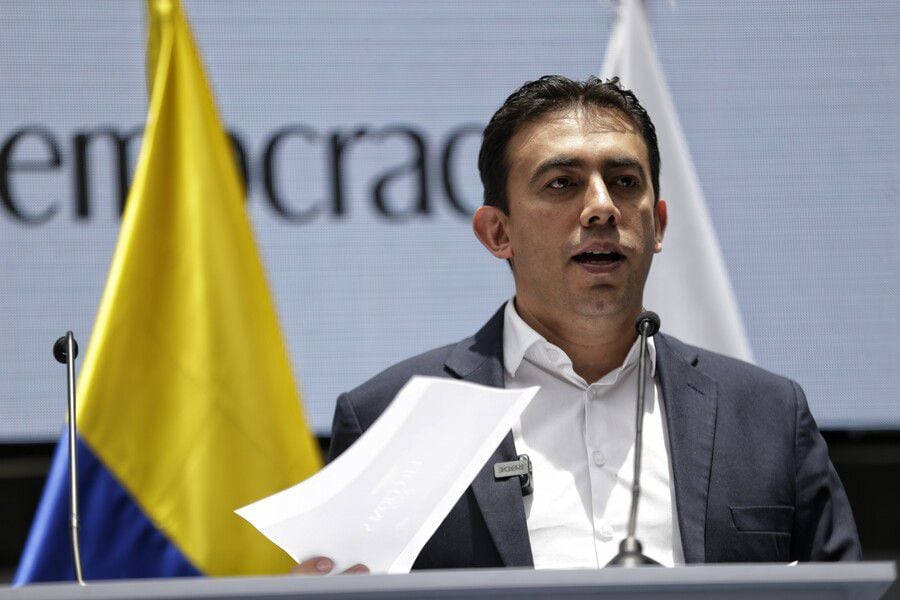
The 2022 legislative elections caused severe controversy in Colombia and left the national registrar as one of its protagonists Alexander Rocha, who not only asked and then dismissed a vote count, but also announced that he will not resign due to several of the inconsistencies during the elections.
The issue generated so much controversy in the country that the website Quesción Pública was tasked with investigating the head of the National Civil Status Registry, who was discovered that his father, Campo Elías Vega Goyeneche, was sentenced to 22 years in prison in 2015 for buying votes for a candidate for the Government of Vaupés in 2004.

The investigation was led by journalist Diana Salinas, who confirmed that the father of today's registrar Vega received such conviction for then-candidate Wilson Ladino Vigoya to win the departmental elections.
The judgment was issued by the same Supreme Court of Justice in Review No. 45801 of the Criminal Cassation Chamber, which shows that Campo Elías Vega Goyeneche withdrew from the electoral contest at that time to give Vigoya free way and help him with money and logistics for his campaign.
In fact, according to the Public Question investigation, the father of today's registrar was the payer of the municipality of Carurú (of which he is a native) and handed several promissory notes to the candidate who, thanks to the work of Vega Sr., turned out to be elected governor of the department of Vaupés.
The media report also reports that Vega Goyeneche withdrew from running for the Vaupense Government to aspire to other positions, which would have made it easier for the former governor to win the regional elections.
The report even points out that the father of today's questioned Alexander Vega offered money to voters to support Vigoya and not other candidates like José Leonidas Soto. In fact, it is even mentioned that the former governor made promissory notes that allowed the suffragants to receive the amount for their vote: “Please help the carrier with $100,000,” say the papers attached to the Public Question.
Not only was the registrar's father convicted with more than 20 years behind bars, but he was also fined more than 54 minimum wages for the offenses of corruption to the suffragant; however, although Vega Papa was acquitted years later, in 2013 the San Gil High Court determined and held firm the charges against Campo Elías Vega Goyeneche, who was formally accused of being an accomplice to the above-mentioned crime.
In other aspects of Diana Salinas's investigation, it is assured that the Vega family has had extensive influence in Vaupés for years, given that not only did the registrar's father influence the election of the president, but Alexander Vega's uncle, identified as Heraclio Vega Goyeneche, was governor of that department in 1993.
Former Governor Vega, the uncle of today's leader of the Registrar, also had trouble with the authorities, according to the media, as the Supreme Court ultimately condemned him for “embezzlement by a “different official application” of thirty million pesos; that is, for mismanagement of public money,” Salinas said.
KEEP READING:
Últimas Noticias
Debanhi Escobar: they secured the motel where she was found lifeless in a cistern
Members of the Specialized Prosecutor's Office in Nuevo León secured the Nueva Castilla Motel as part of the investigations into the case

The oldest person in the world died at the age of 119
Kane Tanaka lived in Japan. She was born six months earlier than George Orwell, the same year that the Wright brothers first flew, and Marie Curie became the first woman to win a Nobel Prize

Macabre find in CDMX: they left a body bagged and tied in a taxi
The body was left in the back seats of the car. It was covered with black bags and tied with industrial tape
The eagles of America will face Manchester City in a duel of legends. Here are the details
The top Mexican football champion will play a match with Pep Guardiola's squad in the Lone Star Cup

Why is it good to bring dogs out to know the world when they are puppies
A so-called protection against the spread of diseases threatens the integral development of dogs



